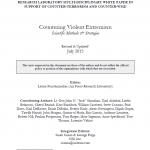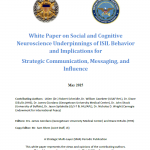
It has now been five years since the events of the “Arab Spring,” and initial optimism about lasting democratic reforms and an era of lessened tensions has been replaced by fear and skepticism. Many countries are now experiencing greater instability and violence than before. The vestiges of Al Qaeda in Iraq have morphed into the Islamic State of Iraq and al-Sham (or the Levant)—ISIS or ISIL, sweeping through Iraq and Syria and leaving behind much death and destruction. The growth of violent extremism initiated by Al Qaeda and its radical interpretation of the Islamic ideology is continuing. ISIL’s deft manipulation of social media to compel and mobilize individuals to act out violently is both remarkable and frightening.


